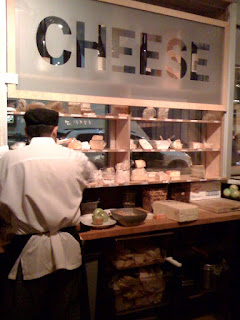Tuesday, November 24, 2009
Great 5 days in Kansas with my family!
Kansas City restaurants. Aiden liked the bathroom sinks. I liked the
artwork. We all loved the food.
Friday, November 20, 2009
Thursday, November 19, 2009
Wednesday, November 18, 2009
On my way home to Kansas
Kansas. Looking forward to Moms homemade greenbean and dumplings soup
with Uncle Joe's smoked sausage on the side. Yum!
Tuesday, November 17, 2009
Sunday, November 15, 2009
Great Chicago pizza
This was my first 20 years. And I am still coming back. So good!
Saturday, November 14, 2009
Ahh Chicago. Good to see you again!
It has been so long since I have been here.
Of course, I will be eating my way through the city.
I am finishing up a presentation (lapttop wireless work) in a cool bar
called Bin 36. The have 49 wines by the glass and 45 different cheeses
you can taste for $3 a piece. I am in heaven!
Thursday, November 12, 2009
Sunday, November 8, 2009
EATING MY WAY ACROSS KOREA
While there was work, there was also food. Korean food is one of my favorites. It is Germany meets Mexico! Much grilled meat and fermented cabbage, but then added with tons of spice, chili and garlic.

BIBIMBAP
My favorites include the bi bim bap (lower right corner in the picture), which is a a simple but popular dish. Bibimbap is a bowl of hot rice served in a bowl topped with a variety of vegetables (cooked and raw) arranged on top. Vegetables can be seasonal, with toraji, bell flower roots, gosari, bracken, bean sprouts, and spinach often served. Other ingredients can include chestnuts, jujubes, ginseng, and a small amount of seafood or meat. Usually a near raw egg is served on the top. Most restaurants prepare the dish with a big scoop of gochujang and red pepper paste placed with the vegetables. This dish comes in a large bowl with rice on the bottom and the other ingredients placed on top. I like it best when it is Dolsot Bibimbap - which means it is served in a red hot stone crock. As you eat, the rice on the bottom of the pot gets crispy - and adds great texture to the dish, and of course, keeps the dish very hot.
KIM CHI
Kim Chi, a pickled and fermented cabbage and vegetable dish (middle right picture) is really my favorite part of every Korean meal. Early kimchi dishes were relatively mild, spiced with fermented anchovies, ginger, garlic, and green onions. Koreans still use these ingredients today, but the spice most closely associated with modern kimchi is red pepper powder. Korea boasts more than two hundred types of kimchi, all rich in vitamins, minerals, and proteins created by the lactic acid fermentation of cabbage, radish, and other vegetables and seafood.
The kimchi served at a meal will vary according to region, season, and may differ according to the other dishes on the menu. A seaside region's kimchi will be saltier than that of a landlocked area, and summer cooks produce cooling water kimchis to contrast with the heartier cabbage kimchis of the autumn and winter. And a delicate cucumber kimchi sits better beside a bland noodle dish than beside a robust beef stew. To understand kimchi at its simplest, think of it is as divided into two kinds: seasonal kimchi (for short-term storage, made from vegetables that are fresh in the markets at any given time) and Kimjang kimchi (for long-term storage, made in quantity in late autumn).
GALBI-GUI or KALBI
Galbi-gui (Broiled Short Ribs) Kalbi is one of Korea's most famous grilled dishes. Beef short ribs are marinated overnight in a mixture of green onions, garlic, sugar, sesame oil, and soy sauce. Rice wine and oriental pear slices can be added for extra flavor. The marinade tenderizes the meat which is grilled over charcoal or gas right at the table. A variation, dwaeji kalbi-gui (broiled pork spareribs), uses pork seasoned with sesame oil, soy sauce, garlic, sesame seeds, and boiled ginger juice before grilling.
I had this dish at the Myongwolgwan restaurant on Walker Hill, high above the city of Seoul. It was my "going away lunch" to myself. The setting is beautiful, as it overlooks the Hangang River. (Top 3 pictures). Myongwolgwan still preserves its charcoal-grill method for turning out delicious meat dishes. The SUPEX kimchi, made using 100% domestically produced ingredients, is the pride of the restaurant: it is prepared in the highest quality environment and fermented in a special kimchi ripening room. The result is kimchi with truly unforgettable flavor and texture. Myongwolgwan’s leading menu is marinated Hanu (Korean-bred beef) galbi.
In addition to the galbi-gui, they also served me a portion of grilled tongue. The tender beef rib meat was my favorite though.
Fortunately for me, there are also some pretty good Korean restaurants in the Bay Area - so I will continue my eating when I get home. And of course, visitors, it will be a choice on the "Rick Tour" of the Bay Area!
Followers
Blog Archive
-
▼
2009
(37)
-
▼
November
(11)
- Great 5 days in Kansas with my family!
- Kansas Salad Bar Fluff
- Breakfast in Kansas. My heart will never be the same.
- Eating some barbeque in Topeka.
- On my way home to Kansas
- I miss this. Do you?
- Chicago food. I deserve rewards tonight!
- Great Chicago pizza
- Ahh Chicago. Good to see you again!
- Rick in Korea - latest photos
- EATING MY WAY ACROSS KOREA
-
▼
November
(11)










